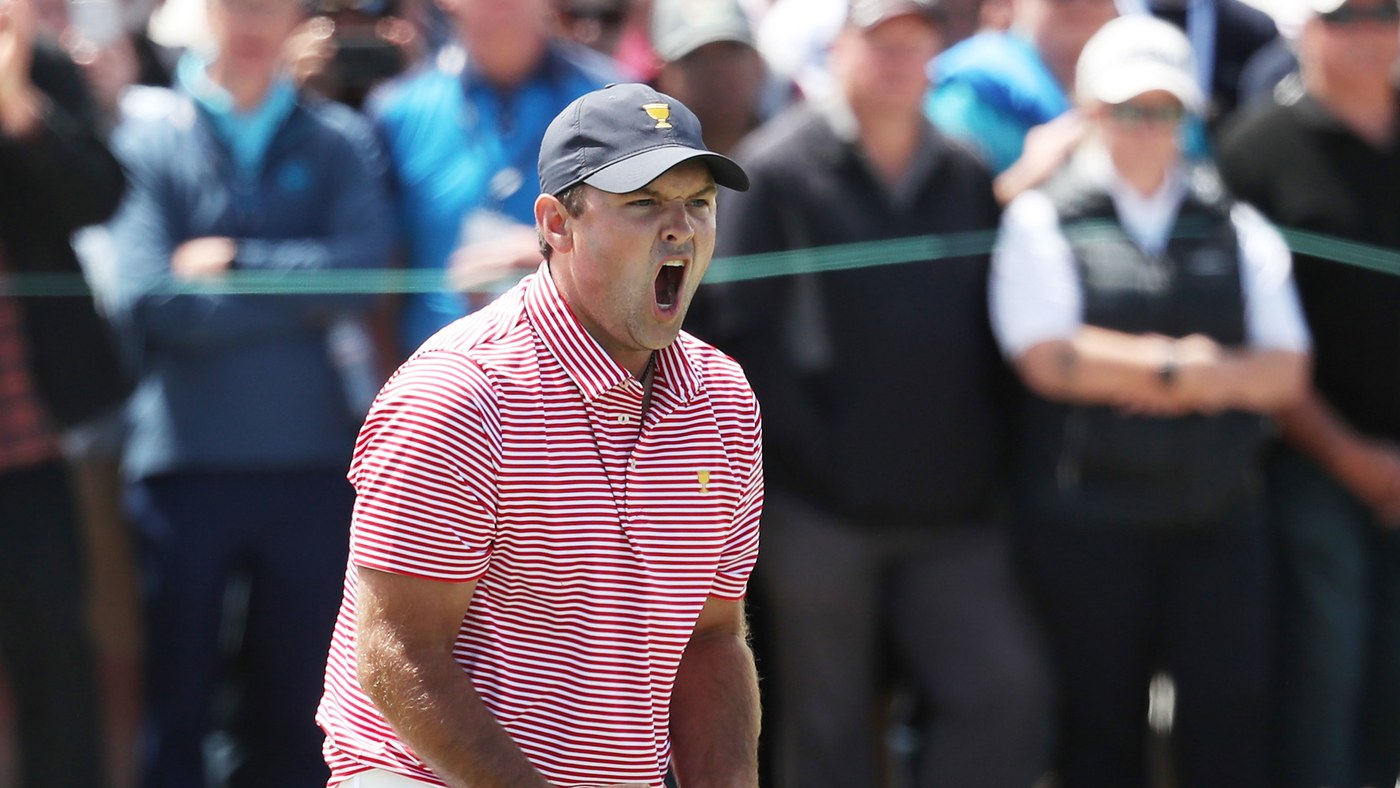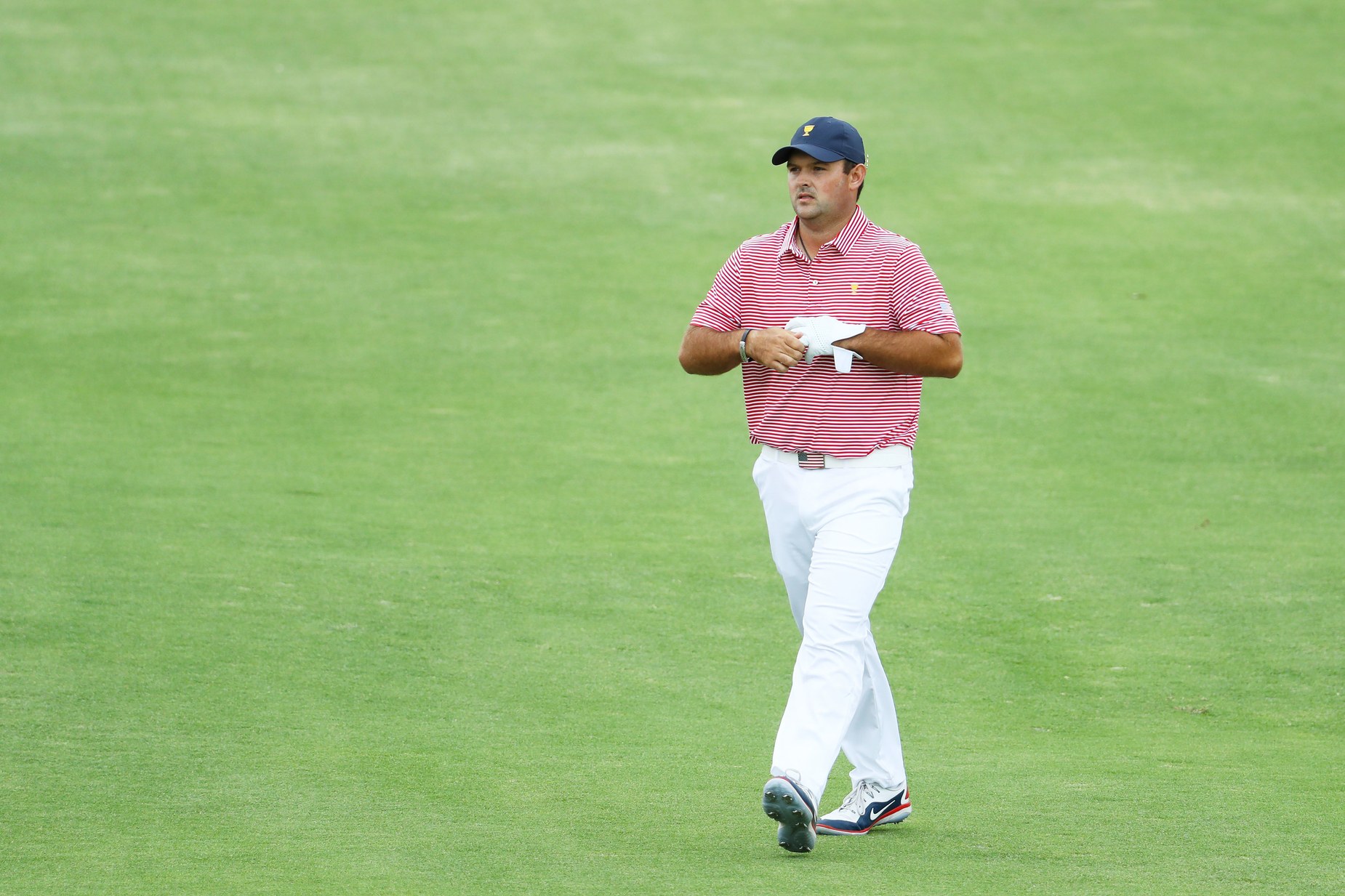Warren Little/Getty Images
Reed walks alone down a fairway during Thursday four-ball matches at Royal Melbourne.
By Shane Ryan
MELBOURNE — Thursday morning. Gray skies, a mist so light it barely deserved the name, and stadium seating populated by Australian actors pretending to be American golf fans. Enter Patrick Reed.
After a vigorous chest-pounding courtesy of Rickie Fowler, Reed emerged from the crowd and strode onto the first tee, where a group of alleged Americans began to sing loudly and immediately. A paranoid mind might conclude that their frantic melodies were meant to keep the lonely voices around them from shouting something undignified about the incident in the Bahamas and thus slandering their … countryman?
Reed smiled and tipped his cap to them, and it’s unclear whether he knew that this group of rabid “Americans” were mostly Australian. (This should have been obvious by the fact that they were singing at all—real American fans are properly repressed, and can’t muster anything better than “U-S-A.”) Along with the punny odes to each player (“You are Hadwin beneath my wings” and “I want it Cantlay”), their mandate for the fourth match in Thursday’s four-ball session that kicked off the 13th Presidents Cup seemed to be running interference for Reed. The minute the “Americans” stopped singing, the Internationals picked up the slack, with a version of “Macho Man” paying homage to C.T. Pan
But they couldn’t sing forever. When the music died, the individual voices of the real fans rang out. They’d been sitting on their best lines, patience wearing thin as the Divided Choir droned on, and the time had come to unleash hell on the American.
“Are you going to make your caddie carry 14 clubs and a shovel?” shouted one.
“Improve your lie off the tee!” screamed another.
The insults got less clever from there, with a few cries of “sand wedge!” and “tell me where the bunkers are!” and the extremely blunt, unfriendly, “cheater!”
Reed, impassive in the face of the barrage, stepped up to hit his first drive, and because life has a sense of humor, it rolled inexorably toward the greenside bunker. When it disappeared over the ledge on the big screen, the crowd roared its appreciation, and one of the Aussies sent him off with a warning: “Patrick, there’s cameras out there too!”
So it began. He marched along in this hostile land, hole by hole, his figure framed by the scraggly low tea trees and the jagged cypresses and flowering gums, green Bermuda fairways giving way to fescue fringe giving way to the incredibly firm bentgrass greens, with the native sword sedge and kangaroo grass and stipa spreading in the heath near the bunkers that wouldn’t leave him alone. He found the sand on each of the first three holes, giving the fans very easy material—”he’s a devil with a sand wedge!” and “watch that backswing, Reedy!”—but he couldn’t escape the catcalls even in the best of times. In one memorable sequence, after hitting a solid approach on the par-4 fourth, a fan yelled out to ask if he had read the rules, drawing big laughs. When he marked his ball, another fan warned him to put it back in the right spot, and after he missed his birdie putt, he got a free piece of advice from another: “Write down 3!”
And what about the golf? Call it lackluster. After some early drama, when Pan and Hideki Matsuyama of the Internationals refused to concede a pair of one-foot par putts on the first hole, amusing Reed and four-ball partner Webb Simpson, and incensing Simpson’s caddie, Paul Tesori (“you guys had two one-footers up the hill and they didn’t give it,” he fumed), things settled down and became almost dull. An illustrative moment came on the eighth hole, when a children’s playground beyond the hedges made more noise than the crowd.

One of the mysteries of the opening pairing selection on Wednesday was trying to discern what Ernie Els was thinking when he put Matsuyama and Pan opposite Reed, but as the action slogged on through the front nine, a conspiracy theory came to me. I imagined an exchange like this in the International team room:
Els: I’m thinking of putting Cam Smith opposite Reed if the opportunity comes. If not him, maybe Scotty, to get the home crowd lined up and ready to kill.
Geoff Ogilvy, smoking a pipe and looking thoughtful: You could do that. Or you could learn from history. Consider Reed at Hazeltine, against Rory. Consider how he rose to the moment, embraced the energy, and took down the best golfer of his generation. Consider Gleneagles. Consider the boos when he shushed the crowd, and consider how he floated on air that week, buoyed by the hatred. Consider how he loves the energy, the confrontation. Consider how he rises to the contentious battle, how he almost needs it. But consider this, too: Can a man like that thrive without conflict?
Els: What are you suggesting?
Ogilvy: Put him against guys who won’t give him an ounce of juice to match, who will barely pump a fist if they make a 40-foot eagle putt. Suck the adrenaline from the course, and let him languish in the boredom.
Els, nodding sagely: I know just the fellas.
And so it played, even if that vignette is pure fantasy. Matsuyama and Pan were solid, but they weren’t spectacular. It’s just that Reed and Simpson couldn’t get anything going, couldn’t hit the big putt, couldn’t give themselves consistent birdie chances. The crowds thinned out after the first few holes, and even the heckling died off until they made the turn. In that languorous stretch, Pan and Matsuyama took a 2-up lead and held it stubbornly in those rare moments when the Americans showed signs of life. Reed’s play wasn’t the disaster it had been in Paris, but it was flat, uninspired, mediocre, until the 16th hole, where he showed a flash of the vintage form with a phenomenal approach followed by a 15-foot birdie to square the match. On the next hole, though, it was Matsuyama who looked like the old Reed, knocking in a clutch birdie putt and unleashing the best fist pump of the day.
Meanwhile, in the first match, Justin Thomas notched another win to push his cumulative team match-play record to 8-2-1 while Reed fell to 11-7-4. It raises a question: Who’s the real Captain America? And another question, too: If Reed can’t deliver wins this week, and if his legacy from Melbourne and Paris is making news off the course—and not the good kind—will he be worth a captain’s pick in the future?
And as for the match—Reed and Simpson could have staved off disaster with even a half point in the last match to finish. Instead, they lost, 1 up, and it gave the Internationals a 4-1 lead—not just the first lead that team has had after the first session since 2005, but the best lead they’ve ever had at this point. The prevailing wisdom before Thursday’s match was that Reed would respond to adversity with his trademark vigor, but when Team USA needed someone to stop the bleeding, Captain America couldn’t muster the magic.
He had one last shot on 18 to square the match—the last shot of the day—and after the long putt ran by, and after he shook hands, and after the International fans found their throats and showered praise on their team, he cut a lonely figure retrieving his ball. Simpson said on Golf Channel that the abuse he took from the crowd was “undeserved,” but who will care? This is the same show Reed can look forward to all week, and if day one is a harbinger, it doesn’t look like a show with a happy ending.









